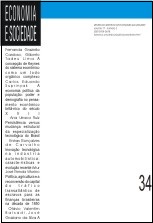Resumo
Em seus escritos sobre a “governamentalidade”, Foucault argumenta que a filosofia política, durante o início do período moderno, perpetrou uma mudança gradual no objeto de exercício do poder, deixando de lado o território para concentrar-se sobre a população. Neste artigo, buscamos associar essa idéia com o pensamento econômico britânico do século XVII, em que noções de gerência populacional estão sempre presentes – primeiramente com autores do início do século como Mun e Misselden, evoluindo então ao longo das décadas seguintes em estreita relação com doutrinas como a “aritmética política” vislumbrada por Petty e culminando no uso extensivo por parte de Davenant das estatísticas demográficas de Gregory King. Além disso, tentamos expor a ligação entre temas populacionais e alguns conceitos-chave então utilizados, mostrando que esses temas não possuíam motivação meramente militar, mas sim derivavam de uma percepção do trabalho como força criativa, à qual podemos associar os rudimentos de uma teoria do valor-trabalho.
Abstract The political economy of demographic management: po The political economy of demographic management: power and popu wer and population in XVII century lation in XVII century British economic thought British economic thought In his lectures on governmentality, Foucault argued that Early Modern Period’s political theorizing was characterized by a gradual change in the object of political power, from territories to populations. We try to link this idea to the development of seventeenth-century British economic thought, in which notions of population management are constantly present – beginning with early pamphleteers like Mun and Misselden, developing along the subsequent decades in a close relationship with doctrines such as the “political arithmetic” envisaged by Petty, and culminating in the extensive use made by Davenant of the demographic statistics compiled by Gregory King. Moreover, we try to expose the connection between demographic themes and some key concepts then adopted, in an effort to show that they were not mere subsidiaries to military concerns, but instead were a direct corollary to a widespread notion of labor as a creative force – arguably the rudimentary origins of a labor theory of value. Key words: Mercantilism; Population; Seventeenth century; Labor theory of value; William Petty.
Referências
BARBON, Nicholas (1696). A discourse concerning coining the new money lighter, In: MAGNUSSON, Lars (Ed.). Mercantilism: critical concepts in the history of economics. London; New York: Routledge, 1995. v. 3, p. 154-206.
CHILD, Josiah (1693). A new discourse of trade, In: MAGNUSSON, Lars (Ed.) Mercantilism: critical concepts in the history of economics. London; New York: Routledge, 1995. v. 3, p. 1-136.
DAVENANT, Charles (1699). An essay upon the probable methods of making a people gainers in the balance of trade. In: MAGNUSSON, Lars (Ed.) Mercantilism: critical concepts in the history of economics. London; New York: Routledge, 1995, vol. 3, p. 207- 365.
FOUCAULT, Michel (1978). Governmentality. In: BURCHELL, Graham et al. (Ed.). The Foucault effect: studies in governmentality. Chicago, IL: University of Chicago Press, 1991, p. 87-104.
JOHNSON, E. A. J. (1937). Predecessors of Adam Smith: the growth of British economic thought. New York: Augustus M. Kelley Publishers, 1965.
LOCKE, John (1691). Some considerations of the consequences of the lowering of interest, and raising the value of money. In: MAGNUSSON, Lars (Ed.). Mercantilism: critical concepts in the history of economics. London; New York: Routledge, 1995. v. 2, p. 55-150.
MAGNUSSON, Lars. Mercantilism: the shaping of an economic language. London; New York: Routledge, 1995.
MALYNES, Gerard (1601). A treatise of the canker of England’s common wealth. London.
MISSELDEN, Edward (1622). Free trade or the meanes to make trade flourish. London.
MISSELDEN, Edward (1623). The circle of commerce or the balance of trade, in defence of free trade. London.
MUN, Thomas. (1621). A discourse of trade from England unto the East Indies. London.
MUN, Thomas. (1664). England’s treasure by forraign trade. London. Reprinted: Oxford: Basil Blackweel, 1928.
PETTY, William (1662). A treatise of taxes and contributions. In: HULL, Charles Henry. The economic writings of Sir William Petty. New York: Augustus M. Kelley, 1963, p. 1- 97.
PETTY, William. (1665). Verbum sapient. In: HULL, Charles Henry. The economic writings of Sir William Petty. New York: Augustus M. Kelley, 1963, p. 99-120.
PETTY, William. (1690). Political arithmetic. In: HULL, Charles Henry. The economic writings of Sir William Petty. New York: Augustus M. Kelley, 1963, p. 233-313.
A Economia e Sociedade utiliza a licença do Creative Commons (CC), preservando assim, a integridade dos artigos em ambiente de acesso aberto.

